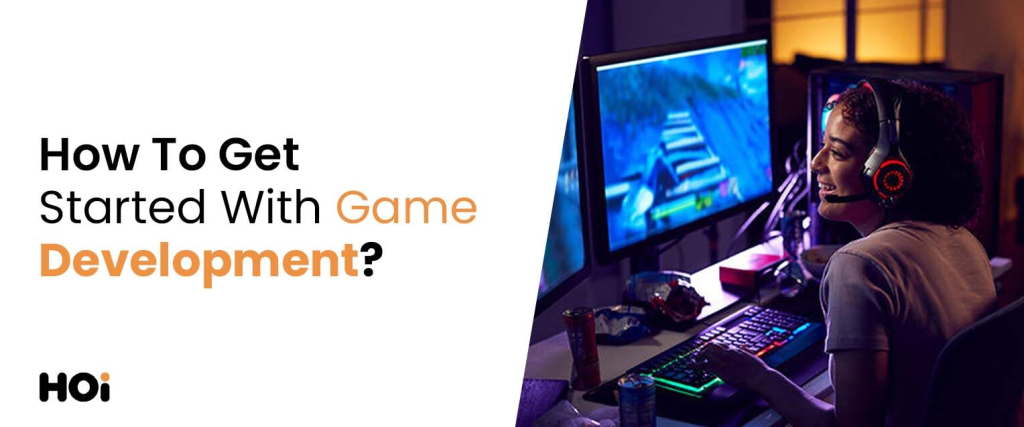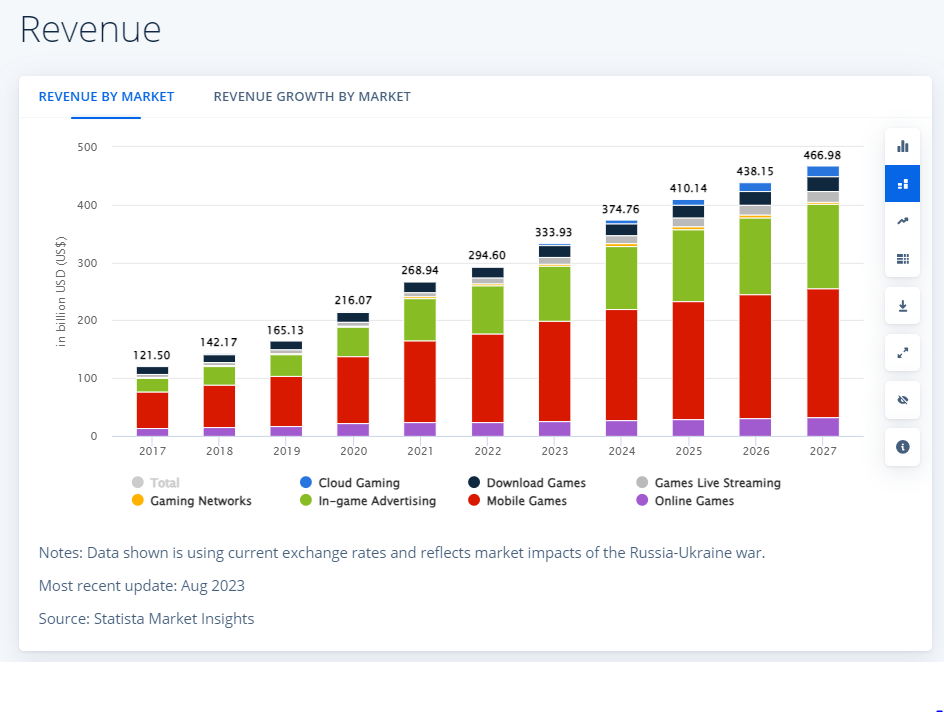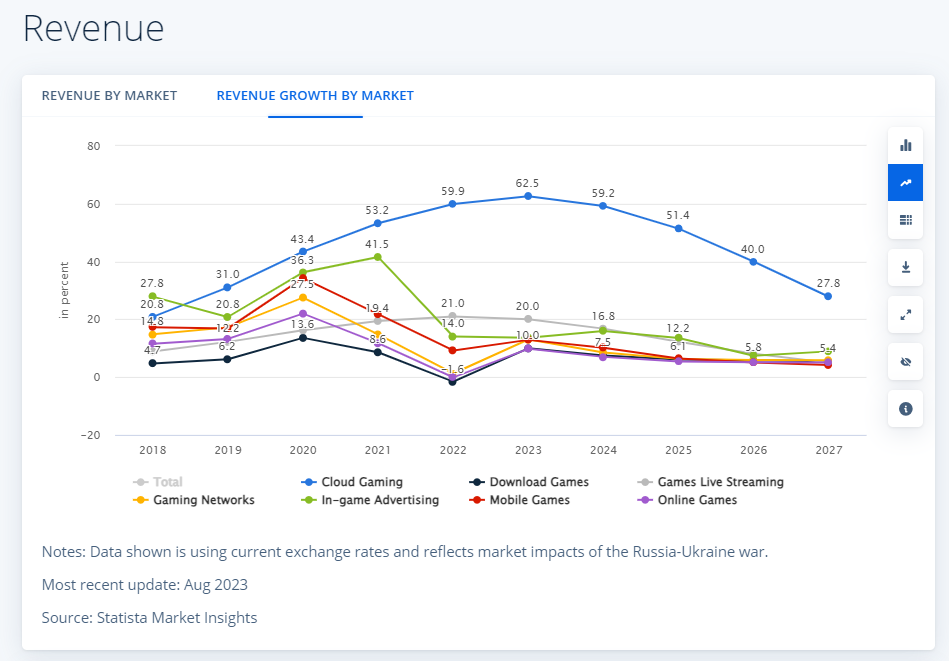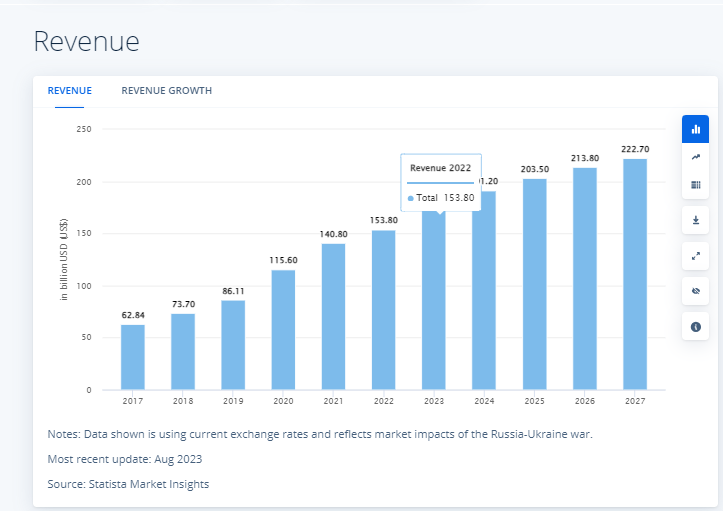How To Get Started With Game Development?

The exponential rise in demand for game app development services from 2010 until now has been remarkable. According to HOI Solutions’ game development company experts, this trend is only going to scale upward from here on, especially after the dominance of Artificial Intelligence, Machine Learning, and Virtual Reality.
A recent study by Statista shows that the global video market will reach $410 billion by 2025, and $466.99 billion by 2027.

One of the reasons for this surge in the past decade is mobile gaming. Now, companies are investing heavily in creating smartphones and tablets that support the latest and most advanced gaming technologies. Statista’s findings also indicate a substantial increase in mobile gaming revenue, projected to exceed $203 billion worldwide and surge to $222 billion by 2027.

Overall, the game development industry is here to stay, with unprecedented growth in the future. Mobile gaming is only an element of the larger picture. The success of eSports and the dominance of Artificial Intelligence, Machine Learning, and Virtual Reality all play a part in this.

If you’re here, we are quite sure you want to jump on the game development bandwagon. However, we know, like most starters out there, you don’t even have a clue about what goes into a game development project, and how it moves from idea to execution.
In this blog post, we are going to talk about how to get started with game development. Let’s begin!
What Is Game Development?
Before you get into the technicalities, you first need to understand what is game development and how to get started with game development. With the right foundation, you ensure that your project stays on track.
Simply put, game development is a tech process where you transform your ideas/concepts into a functioning video game. No matter if the game is Super Mario or God Of War, this principle remains the same.
You can say this process also applies to board games, but in this blog post, we are specifically discussing video games built for PCs, smartphones, or consoles.
Similarly, the game development process can vary depending on different factors like game engines or the game development team. So, remember, when you are hiring a game developer in the USA, there is one specific method for development.
For example, a game like GTA V or PUBG is asset-heavy, so there’s a huge dependency on 3D modeling.
Join the ranks of game creators.
Start developing your game with HOI Solutions and turn your vision into a reality!
The Different Stages Of Game Development
Typically, when you hire a game development services company, they follow a general project cycle. Now, this cycle remains constant whether the project requires a team of over 200 game developers or a solo indie studio. Once you understand this, you are going to have a solid grasp on all elements of the development phases.
Here is a detailed account of each of those stages or cycles:
Developing A Concept Or Idea
Almost all of us in one space of time were visualizing what our dream video game would look like. However, this is where the similarity ends!
Because not all of those who visualize that dream actually do make that dream a reality. Still, since you have read this far, we are 100% sure you are not one of those.
When we are talking about how to get started with game development, it gets tempting to just jump on and start developing the game straight away.
But HOI’s expert video game programmer never recommends this to first-timers. You first need to ask yourself questions like:
- What’s the scope of the game I’ll be developing?
- How long will this game take to develop?
- Does the outsourced game development company I am working with have the team and skills necessary for the development?
- Do I have a clear understanding of what the final product looks like?
This understanding is the core of the entire development process. You may have a basic concept of the game or a specific character, but that’s not enough! When you are getting into game development or hiring a video game programmer and developer, you need to carry out each aspect.
This can include a grasp of how the game mechanic works, the interaction between systems, and more. We know that this information can become overwhelming, so we always recommend hiring professional game developers.
Game development generally follows these two methods to create a manageable game with a high success probability:
- Identify the core mechanic: The jumping in Super Mario Bros or Crash Bandicoot are a prime example of core mechanics.
- Plan the game around that core mechanic: The players will use all of the features built around that particular game mechanic.
Let’s go back to our example again. As you are already familiar with, the core mechanic of Super Mario is jumping. So, all of the elements require jumping in the gameplay:
- Jumping to destroy enemies
- Jumping to collect points and punching blocks
Additionally, this is one of the reasons why games like these were so popular during the 80s and 90s. The gameplay was straightforward, with only one core mechanic.
Designing Your Game
Now, let’s move to another element of how to make a game: Game design.
You have a game idea, but what’s the next phase to get that idea to execution? If your game ideas have 1-2 mechanics, that’s not an issue. However, once you decide to develop a larger game, you’ll need to document it. That particular document is known as ‘game design’.
A game design document helps you with the game’s layout, development, gameplay, art style, and more. Similarly, you’ll also need to provide this game design document to each member of the development team so everything stays on track during the project.
When you get to the actual design of the game, you have 100% control over the creative process. In game design, there is no formula to create a best-selling game.
However, you’ll still need to follow some guidelines. Keeping the game design document clear and concise would help the video game developer create a digital product that is engaging for the players.
Testing Your Game
Testing your game before it goes public is another important consideration you should look out for. How will you know the players will interact with the game like you want them to? How will they get a hang of the instructions and core mechanics?
All of these may seem obvious at first glance, but a lot of first-timers make this mistake. That’s why you should always run different tests to ensure your game is functioning as intended.
Furthermore, at this stage, you can also check for crashes, consistent frames per second or FPS, and other relevant factors important for your game. They might not be as obvious as bugs, but they still have a significant impact in the long run.
Finalizing Your Game
There’s a concept among game developers that goes like this.
The first 90% of your game will take 10% of the development time. In comparison, the last 10% is responsible for utilizing 90% of the remaining development time.
If you ask our game app development company experts, this is a bit of an overstatement. However, the thought behind this theory is quite accurate to some extent. Let us explain.
When you are finalizing your game, you’ll have to run tests, remove bugs, add the final art style, and other stuff before winding up the project for good.
Publishing Your Game
Once your game is complete, it’s now ready to market effectively. Who would buy and appreciate your product if no one is seeing or talking about it? Fortunately, in this day and age, you have the opportunity to make your game public more easily than before. Go online, and you’ll find thousands of websites that are ready to publish your game.
What Type Of A Game Do You Want To Create?
Here’s another thing to consider when you are getting started with game development. That is knowing what type of game you are actually going to develop. Here are the different types of video games:
2D Games: These are relatively straightforward to develop, that’s why most game entrepreneurs choose as a game engine.
3D Games: 3D is one step ahead of 2D in terms of graphics and performance. Additionally, after 2D, most game entrepreneurs choose this, especially when they don’t want to compromise on graphics.
Mobile Game Development: This is one of the fastest-growing gaming development sectors in the past decade because of touch controls.
Virtual Reality Gaming: Virtual reality is seeing tremendous growth in almost all sectors, including game development, where players are now getting more immersive experiences.
AR or Augmented Reality Gaming: AR technology is slowly becoming mainstream with the raving success of games like Pokémon Go.
How To Make A Game Using Different Game Engines
Now, let’s get down to the technicalities of how to get started with game development. Once you have the idea and the game design document in place, you’ll need to choose a game engine.
In case you aren’t familiar with what a game engine is, here’s a quick introduction.
A game engine is more like a development framework that enables the game development company to create a functioning digital product. It also provides them assistance in structuring, level building, and aligning logic for a specific platform.
The whole development process essentially relies on the game engine you work with. Some game engines are easier to manage and can develop games similar to Super Mario Bros., Whereas in some cases, you’ll need a game development company like HOI Solutions to develop complex games.
Below is a list of the popular game engines you need to know if you are thinking about how to get started with game development. Even though there are other game engines out there, these are the preferred choices of developers globally. There are a couple of reasons for this.
Firstly, these game engines are easily accessible. Almost any developer can find and utilize them whenever they want. Secondly, there is a thriving and growing community of these game engines, so it is easier to find assets, resources, and expert opinions.
1. Unity
Unity is one of the leading game engines in the market right now. Unity is accessible, making the development of almost any type of game possible. Secondly, this game engine is also cost-effective, with a free subscription plan for testing out the platform.
As we were saying earlier, Unity is an accessible and versatile game engine. This allows the game development company in the USA to create 2D, 3D, VR, and other games for a diverse range of platforms.
2. Godot
Godot has become such a success because it has an open-source engine. This means that you don’t have to get a subscription when you want to develop 2D and 3D games. Additionally, as Godot is an open-source platform, you’ll get regular fixes and features for your game.
Apart from that, you can also get customized versions from independent developers. So, overall, if you are thinking about how to get started with game development, then you should consider Godot for the game engine.
What types of games can I create? With Godot, you can develop a plethora of 2D and 3D games. However, we recommend this specifically for 3D games because of its features.
3. Unreal Engine
Unreal Engine was built by Epic Games to deliver vivid and hyper-realistic 3D graphics. Both Unity and Unreal Engine are the #1 choice of everyone from independent developers to AAA game studios like Rockstar. So, if you want to develop something that is complex with realistic graphics, then Unreal is the right choice.
What types of games can I create? Unreal Engine is primarily built for 3D games. Along with that, you can also create VR, AR, and multiplayer games with this game engine.
Why Should You Hire Dedicated Game Developers From HOI Solutions?
So, that was everything about how to get started with game development. Now, it is time to collaborate with experts!
HOI Solutions takes pride in acknowledging that we are the leading mobile game development company in the USA. We offer game app development services to almost all gaming entrepreneurs, ranging from startups to veterans in the industry. So, when it comes to game design and development, we are the #1 choice of our clients.
And now that you are familiar with the fundamentals, take the next step towards unleashing your creativity and exploring innovative game concepts. Explore our blog where we delve into 62 game development ideas, providing inspiration and insights for your next gaming venture.
Ready to create the next big hit? Dive into game development with us and bring your ideas to life!
FAQs
How to become a game developer?
To become a game developer, start by gaining proficiency in programming languages like C++, C#, or Python. Acquire skills in game design, art, and storytelling.
Consider formal education in computer science or game development. Engage in practice by creating your games and building a strong portfolio. Explore available resources like online tutorials, game development communities, and industry-specific forums to learn and grow your expertise.
How do I code a game?
To code a game, start by choosing a game development platform or engine such as Unity, Unreal Engine, or Godot. Learn the programming language associated with your chosen platform (e.g., C# for Unity, C++ for Unreal). Utilize the engine’s documentation, online tutorials, and community forums to understand the basics of game programming.
Begin by creating simple projects, gradually advancing to more complex games as you gain proficiency in coding and game development concepts.
Can I create my own mobile game?
Absolutely! You can create your own mobile game. With the right tools, resources, and dedication, it’s possible to design and develop a mobile game. Choose a game development platform or engine suitable for mobile game creation (e.g., Unity, Godot, or GameMaker).
Acquire the necessary skills in programming, design, and storytelling. Engage in practice and utilize available tutorials and community support to bring your game idea to life.


